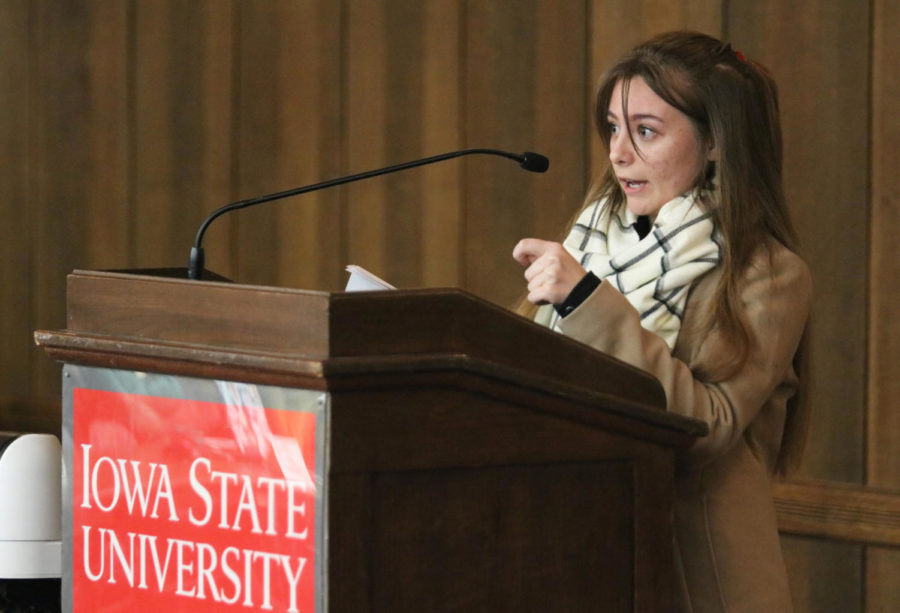- App Content
- App Content / News
- News
- News / Politics And Administration
- News / Politics And Administration / Campus
After delays, student election season begins Monday
February 9, 2019
Three delays, 25 days and one week of bad weather later, the 2019 Iowa State University Student Government Election cycle is ready to kick off.
The original timeline, approved by Student Government on Nov. 14, 2018, mandated that executive slate candidates were to submit their statements of intent and candidate information sheets by 9 p.m. Jan. 18, during the first week of classes. The deadline is now 9 p.m. Monday.
Former Election Commissioner Bradlee Fair resigned due to health-related reasons shortly before the election cycle began in January, leaving no one in charge of elections at the start of the semester.
“Julian [Neely] and I learned about [Fair’s] unfortunate circumstances, that she was not going to be able to serve, around a week before classes started,” said Vice President Juan Bibiloni. “Between interviewing and applications, we were not able to get a commissioner seated until the first meeting of the semester.”
Emily Rizvic, a junior in political science and a member of the election commission, was seated as the new election commissioner on Jan. 16.
Due to the turnover, the deadline for statements of intent was pushed back to Jan. 25 to give the election commission time to adjust and organize with a new commissioner and to give students more time to decide to run for a position.
On Jan. 27, the deadline was pushed back to Feb. 4, partly due to the weather and partly due to the election commission’s troubles becoming an independent student organization.
“Ultimately, what lead us to this change in the Election Timeline was unforeseeable circumstances, one of which was our former commissioner resigning due to her health and the other getting [the] election commission to be recognized as a student organization,” Rizvic said.
Fair had decided last semester to make the election commission a separate student organization to streamline the process of candidates paying for their campaigns.
“Historically, what happened if you wanted to run as an executive slate, you set up a student organization,” said Cody Woodruff, a candidate for student body president who currently serves as the speaker of Student Senate. “Those are not actual organizations that are meeting, other than for campaign purposes, and it was just a way to funnel the money through. The Student Activities Center, Campus Organization Accounting and the Election Commissioner Fair wanted to find an alternative.”
The election commission, as an independent student organization, would be able to handle the money used for campaigns, as well as keep better track of it.
The approval for the constitution was slow to be given, which meant no candidates could use any of their funds, whether privately or publicly funded.
On Feb 1., the election start date was pushed back one final time to its current date. Students have until 9 p.m. Feb. 11 to submit statements of intent to run for either executive or senatorial slates. The entire cycle, with the exception of the presidential and vice presidential debates, was adjusted back one week.
The three executive slates suggested the move to the election commission, as the commission was still having issues with the transition to a student organization and, by extension, getting the candidates their funding.
“All three slates have worked together very well, which has been awesome to see,” said Austin Graber, who currently serves as a senator in Student Government and is running for student body president. “Usually, when you are competing with others, you aren’t going to be working with them, but we have all had to come together and work with each other.”
The timeline adjustments and funding issues have caused some issues for the campaigns of the executive slates. On Feb. 6, Student Government voted to fund $700 to each executive slate’s campaign, as part of their $2000 limit, to allow the candidates to begin purchasing supplies for their campaign.
One candidate for student body president, Benjamin Whittington, said the delays have made it difficult for his campaign to organize.
“In future years, if we really want to take these elections seriously, which I think we should, if we really want to inform students about the importance of these elections, we need to have a plan for them a year in advance,” Whittington said.
The timeline delays have given more time for students to run for senatorial seats. Bibiloni said there seemed to be less interest in running for Senate compared to previous years, possibly due to the commissioner change and less promotion of the available seats.
Bibiloni encouraged anyone who was considering running to take advantage of the extended deadline and apply.
“The worst excuse for not running is saying that you’re not qualified enough,” Bibiloni said. “If you are thinking about doing it, it is because you have a genuine interest in helping the student body and you want to be a leader in it.”
Students who are interested in running or have questions may contact Vice President Juan Bibiloni at [email protected].
















